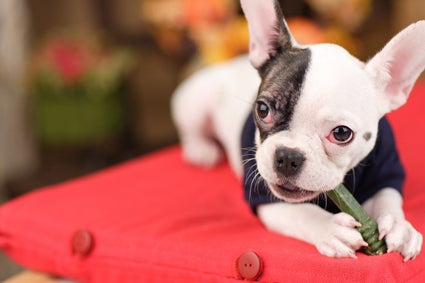Tips for Socializing an Adult Dog After Adoption

In the wild, dogs are socialized from birth by interacting with other pups as well as adult dogs. They learn from verbal cues as well as body language how to live in a community. Domestic dogs can be socialized in much the same way, simply by exposing them to new things while they are very young.
If a puppy doesn’t receive adequate socialization during the first few months of life, he may not grow up to be a confident and well-adjusted adult dog. Unfortunately, many of the dogs that end up in the shelter system are neglected or abused, and many of them have not had adequate socialization. If you are adopting an adult dog from the shelter, be prepared to do some work socializing him.
How to Socialize an Adult Dog
To socialize a puppy, all you really need to do is introduce him to as many new things as possible. Puppies are malleable which means that they can adjust quickly to unfamiliar situations and the next time they find themselves in a similar situation, they’ll be mentally prepared. Socializing an adult dog can be a little more difficult because they dog may have already developed a fear response – you’ll have to condition him to negate that fear response before you can move forward with socialization. Here are some tips for socializing an adult dog:
- Build a strong bond of friendship and trust with your dog so he becomes comfortable around you – this will be important later when you take him places that might make him nervous.
- Take your dog to new places (like the dog park) but don’t force him to engage or interact – allow him to observe from a distance until he is no longer afraid.
- Encourage positive behaviors by using verbal praise and food rewards. For example, if you’re observing dogs at the dog park, give your dog a treat every time another dog comes up to say hello.
- Condition your dog to have a positive response to new things – if he starts to get nervous, distract him with a toy or praise him and give him treats.
- Try taking your dog to an adult obedience class, but only if he is able to remain calm and non-aggressive around other dogs.
- Once your dog is comfortable in your home, bring new people in to meet him one at a time or in small groups – keep issuing praise and food rewards for positive interactions.
- Encourage your dog to seek your attention and the attention of others – when you’re at home, don’t go looking for him wherever he is hiding. Just wait for him to come out to give him attention.
- Show your dog that you are calm in situations where he feels nervous – your dog will respond to your cues. If you act nervous, he’ll learn that there is something to be nervous about.
Adopting a dog is a noble and wonderful thing, but it does come with its challenges. Before you adopt, make sure that you can handle the commitment for socializing, training, and caring for your new friend. A dog is not a plaything – it is a living, breathing thing that deserves your love and affection as well as your respect.
Photo credit: Laikuen/Bigstock
Please consult the services of a Professional Dog Trainer, Behaviorist or Veterinarian before implementing any of the advice contained on this site.










 Your Privacy Choices
Your Privacy Choices